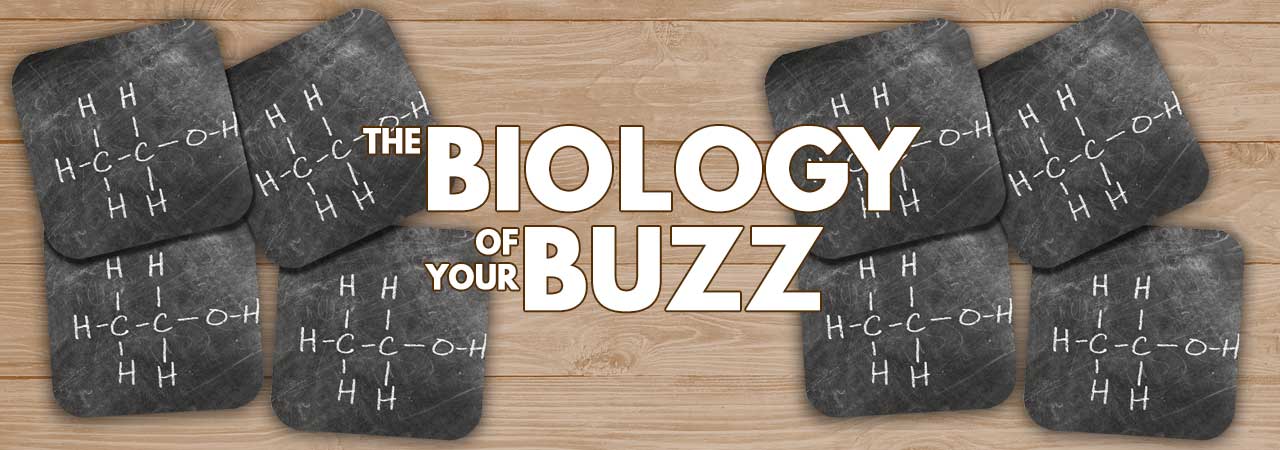The Biology of your Buzz
We all have that friend. The one that insists on telling you that they only drink beer because whiskey gets them too drunk. Or, I stick to vodka because tequila makes me crazy.

We all have that friend. The one that insists on telling you that they only drink beer because whiskey gets them too drunk. Or, I stick to vodka because tequila makes me crazy.
This got me thinking. Is it really the type of drink that matters? What if you were looking to chill out for the night, would a glass of wine affect you differently than a cocktail? Would a pour of Bourbon be all that different than a beer or 2?
My first inclination was to look online for answers. There was a fairly large study done that concluded that drinking spirits “is more likely to result in feelings of aggression” than other drinks. As I read the results of the survey it brought up more questions then answers for me. The results indicate that younger people responded that they were energized by any drink, especially men, regardless of the contents in the glass. It also suggested that wine had more tendencies to relax people and was more positive. This was a survey asking people to respond to their own recollection of how they felt after drinking. Dubious to say the least.
This is far from concrete so I decided to take it a step further and ask for an expert’s opinion on the chemistry of alcohol.

Ian Glomski, PhD, is the Founder and Master Distiller at Vitae Spirits in Charlottesville, VA. His qualifications are quite impressive. Taken from their website: A former Professor of Microbiology at the University Of Virginia School Of Medicine, Ian has had a profound fascination for over twenty years for microbes and how they sculpt our macroscopic world. An experienced brewer, winemaker, cheesemaker, meat curer, kefir culturer, veggie pickler, wild mushroom forager, and infectious disease specialist, anything having to do with microbes turns him on; having trained at the Pasteur Institute of Paris, founded by the father of modern fermentation Louis Pasteur.
He knows his way around a petri dish.
After Googling what kefir is (still not sure) I shot him an email trying to get a better understanding of the science of alcohol.
Is there a physical/chemical difference in the makeup of alcohol?
Yes, there are an astounding number of different chemicals in our typical liquors. Usually when we talk about drinking alcohol we mean ethanol, but the truth is there are lots of different types of alcohols in our liquors. Some examples are a) methanol – rather toxic stuff that can kill you, b) isopropyl (rubbing) alcohol, c) isopentyl alcohol – irritating and choking, d) isobutyl alcohol – relatively non-toxic but smells like solvents. These are the major alcohols but there are many more in smaller quantities.
In addition to these, there is a huge number of other chemicals including esters, aldehydes, fatty acids, and many others. Most are produced by yeast during fermentation, chemical reactions and during aging.
Does the distilling process for Bourbon produce a different type of alcohol then say wine/beer/tequila/gin etc?
Yes. A fundamental reality is that if 2 things taste and/or look different it is because there is a chemical difference. Essentially all steps of the production process cause these differences; different yeast strains tend to make different chemicals (referred to as congeners) depending on what they are eating (yeast essentially eats sugar to produce alcohol and there are byproducts produced in that process). Distillation techniques remove different chemicals, aging in barrels adds chemicals and permit slow chemical reactions to take place that make new chemicals. These add up to the huge array of differences we see in our liquors.
Does mixing a drink alter alcohol? For example, do sugary drinks physically change alcohol?
For the most part, no. That said, it usually does dilute it and add a bunch of other stuff to it. Liquor is pretty stable on the time scale of mixing it and pouring it down your gullet. However, I should note that our bodies can treat it very differently depending on all the things we change when mixing a drink.
Liquors vary greatly in their chemical makeup. What I am not convinced by is the huge physiological differences people attribute to these differences. Just speaking from experience, I have an example from the wine business: People tell me all the time that they get headaches from the sulfites in red wine, whereas the fact of the matter is that white wines usually have far more sulfites than red and most dried fruit have far more than either, yet people don’t complain about headaches from dried apricots. Yes, the different chemicals in liquors might cause differences in people’s biology, but in the liquor itself, these other chemicals are in pretty vanishingly small concentrations that I find it hard to believe they make huge differences in people’s physiological responses. Regarding mixed drinks, I think anyone that downs 6 rum and cokes is bound to get messed up from all that sugar and caffeine, who would drink 6 Coke’s in a night if it didn’t have rum in it?
There you have it. Physical differences do exist within the various types of alcohol; however, the differences don’t entirely encompass people’s reaction to the alcohol. Your mood and what else is added to that drink play a much bigger role in their reactions. So, the next time your friend tries to blame tequila on why their pants ended up in the neighbor’s pool, you have scientific evidence from a real Doctor that it wasn’t the tequila’s fault.
